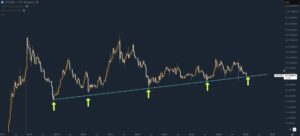Prominent crypto commentator Arthur Hayes said ChangPeng Zhao faced ‘absurd’ penalties in his sentencing, noting that former Goldman Sachs CEO Lloyd Blankfein did not get the same treatment for his wrongdoings.
As written in a new essay posted on his Substack, Arthur Hayes argued that Binance and its founder Changpeng “CZ” Zhao have been treated unfairly because the crypto exchange, and other centralised exchanges, represent a threat to the traditionally American-led global financial system.
Last week, Binance and its founder were charged for violating sanctions and money-transmitting laws, agreeing to pay $4.3 billion in fines and prompting CZ to step down as CEO. CZ was also determined to be a flight risk and must therefore remain in the US until his sentencing on February 23rd next year.
When compared with penalties dished out to traditional financial institutions, those levied against Binance and CZ are “absurd” and underscore “the arbitrary nature of punishment at the hands of the state,” Hayes said.
“Did Former Goldman Sachs CEO Lloyd Blankfein get the same treatment as GS under his reign helped Former Malaysian Prime Minister Najib Razak and financier Jho Loh steal more than $10 billion,” Hayes wrote, referring to the 1Malaysia Development Bhd. (1MDB) scandal that came to light in 2015. Goldman Sachs was fined $2.9 billion in 2020.
“No, Lloyd got to retire with his stock options intact, and GS was not deemed criminally responsible,” he added, pointing out that CEOs of major banks did not face prosecution for the 2008 financial crisis.
I ain’t no Dostoyevsky, and this is not a philosophical discussion of crime and punishment, but what does this absurdity tell us about our beliefs? It tells me that crypto is one of the most important political, financial, and technological developments in civilised human history. We are attempting to create a parallel financial, political, and economic system that is based on voluntary participation rather than violent coercion.
While some argue that CZ effectively got a ‘slap on the wrist’ for his misconduct, Hayes highlighted the double-standards in the US’ approach as it relates to US and non-US entities.
Hayes continued, adding that CZ’s treatment is indicative of resistance against decentralisation and the so-called blockchain revolution, which directly challenges state power, per Hayes.
He continued:
The state powers centralisation, and collaboration is achieved through threats of violence. A problem for the financial and political establishment was that the intermediaries facilitating flows into and out of the industrial revolution named blockchain were not run by members of their class.
An American entrepreneur, Hayes himself is no stranger to government prosecution. In February 2022, he pleaded guilty to violating the Bank Secrecy Act because he wilfully did not implement an anti-money laundering (AML) program at the exchange. He was sentenced to two years of probation later that year.
Did you like the article? Share it!


